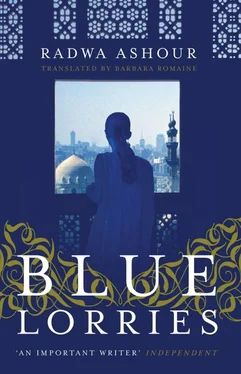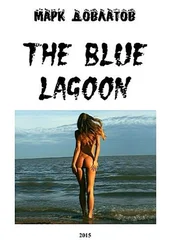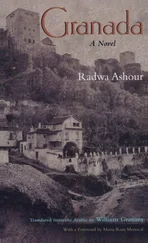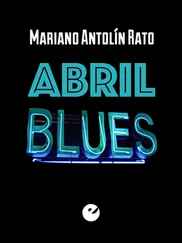I made myself a cup of coffee, which I drank with what was left of some pieces of toast that I found in the kitchen. Then I started on her bedroom. I swept the room, washed the window and its wooden shutters; I polished the bed-frame, the wardrobe, and the dressing table; and I sprayed the mirror with glass-cleaner and scoured it. Then I resumed my assault on the sitting room. After that I moved on to the bathroom. I washed down the walls, the bathtub, the sink, and a glass shelf on which partially used bottles of liquid soap and various creams rested; having finished with that, I scrubbed the floor. Then the kitchen: the refrigerator, the wooden cupboard, the round table, the two windows, the floor, and the walls.
When I was finished, I looked around at the flat. ‘She’d be happy with these results,’ I murmured. I considered going out to get dinner, then thought better of it. The idea of going out and walking to a restaurant seemed more uncomfortable than going hungry. I went into her bedroom, got into bed, and slept.
In the morning, I left the flat. I turned over the key to the doorman, made my way to the Metro station, and from there to the airport.
Hamdiya chided me for coming home in brown trousers and a yellow blouse. ‘It won’t do,’ she said. She bought me some black clothes and insisted that we hold a night of mourning. She said, ‘You announce it in the paper, receive whoever attends, and Nadir and Nadeem stand with you to receive condolences on the death of their grandmother. (I was startled that she should come to this simple and spontaneous conclusion that my mother was their grandmother.) She said, ‘We’ll distribute alms for her soul — did she convert to Islam?’ I didn’t reply, because I didn’t know. My silence made Hamdiya uncomfortable. ‘I’m asking you,’ she explained, ‘so that I’ll know, if she did convert, to play a recording of the Qur’an during the mourning. I think it would be appropriate, even if she didn’t convert — we should recite from the Qur’an for her and pray for mercy on her soul.’
That year I was stricken by the first of my bouts of depression.
Chapter seventeen
The unfinished letter
I didn’t notice the letter was there until after I got back to Cairo. I was sorting the papers and filing them in folders, so as to preserve them, and it caught my attention. How odd: a letter from my mother, addressed to me, that she had never sent, or even finished, although it was exceptionally long. The date at the top indicated that she had written it about two months after that catastrophic trip I had dreamed would make her happy, but which instead became an ordeal for me and for her. I wondered, why didn’t she send it? Why didn’t she finish it?
My mother wrote:
Dear Nada,
No doubt you remember that extraordinary night when Gamal Abdel Nasser resigned in a speech that was broadcast live on television. You remember how your father wept, certainly, but I don’t know whether you remember what he said to me when I told him I didn’t understand why he was crying over a man who had sentenced him to five years in prison. He shouted at me that I was blind, and he stormed out. You may not remember his saying these words, but he did. To me, those words were the final and irreversible separation between us. The differences between us, and our continual rows, were, for me at least, open to negotiation and reconsideration — differences that didn’t mean the end of the world or of our relationship. But when he told me I was blind I knew immediately that our relationship was over, not because I was angry at some insult he’d flung in my face, but because I was convinced that I could never see what he saw: and I think when something like this happens it means that the break has come, and that any subsequent attempt to make it up will be merely redundant.
I left Cairo with so much heavy baggage, I don’t know how I was able to carry it. I was going alone, leaving behind me my only daughter, the man I had loved and a relationship upon which my world was founded — I left all these behind me like a house destroyed by an earthquake. Then, too, there was one other bag I carried that was perhaps heavier than all the others. I was wondering: Am I blind? And if I am blind, then is this blindness an inherent defect over which I have no control, or is that I didn’t know, or couldn’t find a way, to look and to see? It may seem like a silly or trivial question, but it continued to dog me for months, perhaps years. I don’t know Arabic. I lived for years in Egypt, and I was unable to speak the Arabic language, much less master it. I didn’t understand your grandmother or your aunt, I didn’t altogether understand the neighbours, and among Egyptian women I had no close friend. I was on amicable terms with many of them, but I lived in a state of peculiar disorientation, which no doubt I will describe to you in detail someday.
I’m a village girl, Nada, from a border town a long way from Paris. You know this. You also know that I come from a family of fishermen: my father and grandfathers were fishermen — which is to say, we were never wealthy, never noted for anything of consequence. (Perhaps it was a shared feeling of alienation that brought your father and me together — initially, I mean. My words may be imprecise; I was struck by the handsome figure he cut, and he said that he likewise found me pretty, but I feel sure that some sense of dislocation drew us to each other.) I fell in love with your father, and so we married and moved to Egypt.
Even now I don’t completely understand how people saw me, or the ways in which they dealt with me. I found myself all at once in an unfamiliar situation. I wasn’t Madeleine the village girl, a typist who lived in Paris among the marginalised; rather I was Madame Selim, the Frenchwoman, wife of the university professor — even if he was in prison — teacher of French at a school whose pupils were mostly daughters of the upper class. Suddenly I was possessed of a kind of authority — it was like a cloak that had been thrown over my body. I saw other Frenchwomen in Egypt, wearing the same cloak and proud of it as if it were an expensive fur coat. As far as I was concerned, the cloak was more like a coat of thorns — or let me call it, rather, a strange garment that made me uncomfortable because I didn’t recognise myself in it. All that remained to me was my relationship with your father. And when he told me I was blind, there was nothing left to induce me to persevere. I left, only to discover afterward that a world, whether here or there, no longer existed for me. I discovered that, even after years of separation from the man I loved, his marriage to another woman angered me, and his having children with her angered me still more. There he was, falling in love, getting married, and having children, while at the same time he still stood as an obstacle between me and everyone else. I had no luck forming any comparable relationship with another man. He ruined my life, but here’s the paradox: He ruined it after we separated, not before. This is a long story, at any rate, that I don’t want to go into. I got caught up in my reminiscences, and have written things I didn’t mean to write, entangled in my own words, on subjects I didn’t and don’t want to discuss.
Meaning to please me, you paid more than you could afford so that we might go to Yvoire. I should have told you candidly that I didn’t want to go. Yes, I was frightened of that journey. But I also wanted it — otherwise, how do you explain my having gone along with your insistence and submitted to the temptation of returning to Yvoire, even though I was apprehensive about it?
My previous visit to the village had been painful beyond imagining. I hadn’t yet recovered from that pain, or become reconciled to the reality that my village — that familiar realm minutely connected in a thousand ways to my childhood and youth — had metamorphosed into something resembling a railway station, or a marketplace well-trodden by the feet of people passing through, or a tourist resort accessible to anyone having the price of admission. The great big tourist buses were the first thing I saw when I came in sight of the village: a suitable prelude to what I would see moments later in the village itself. The place had changed, utterly changed. The narrow, cobblestone streets remained the same as they’d always been; the houses still stood, as ever at close quarters; the old fortress; the church; the lake — all attesting that this was Yvoire and not some other village, but it had become a different village, taken over by hordes of tourists who filled the streets and alleyways with their languages and loud voices and the flashes of the cameras slung around their necks, until it was time for them to move on to the next village on their holiday itinerary. Chic restaurants and cafés for an affluent clientele. And to top it all off, I couldn’t find the way to our house. How could that be? I passed the house twice without recognising it, and was disoriented for a moment, finding everything thrown into confusion. I went back to where the house should be. ‘Here is our house,’ I said. But where? Before me was one of those souvenir shops catering to the tourists. Then I caught sight of my mother: ample, smiling, doing a brisk trade with the tourists. I went in and hugged her, but we had no chance to exchange more than a few words, for the tourists were waiting, holding colourful postcards or clutching wooden dolls they wanted to buy, or looking to ask the price of some memento or other. I left her to carry on her business with the tourists, and went into the house to see my father. Where had the house gone? It had been eaten by a wolf. The façade of the house, two of its rooms, and the little garden, once my father’s refuge after he retired from fishing, had been appropriated by the shop and its rose-bedecked entryway. The wolf had left only one gloomy room leading onto a small kitchen, and the toilet. ‘How does Papa spend his days, Mama?’ She said with a dismissive gesture, ‘He’s always complaining, but I’m busy with the shop.’
Читать дальше











